|
|
|
Sort Order |
|
|
|
Items / Page
|
|
|
|
|
|
|
| Srl | Item |
| 1 |
ID:
158456
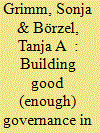

|
|
|
|
|
| Summary/Abstract |
In this essay, we assess how the European Union supports the development of postconflict Western Balkan societies toward stable peace, economic prosperity, and consolidated democracy, moving them along the path to Denmark. Our analysis reveals that the EU has contributed to effective and democratic governance in its southeastern neighborhood. At the same time, its effectiveness as an external good governance–builder varies. Structural postconflict conditions that are not conducive to democratization, conflicting policy objectives, the dynamic interplay between the EU and Western Balkan governments, and the involvement of domestic third-party actors in the reform process explain this variation. To make EU good governance–building more effective, we recommend acknowledging conflicting objectives and using governance-building instruments consistently and credibly to reconceptualize external good governance–building as a dynamic process between external and domestic actors and to take domestic actors and their preferences seriously.
|
|
|
|
|
|
|
|
|
|
|
|
|
|
|
|
| 2 |
ID:
158451
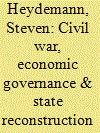

|
|
|
|
|
| Summary/Abstract |
Civil wars currently underway in Libya, Syria, and Yemen demonstrate that patterns of economic governance during violent conflict exhibit significant continuity with prewar practices, raising important questions along three lines. First, violent conflict may disrupt prewar practices less than is often assumed. Second, continuity in governance highlights the limits of state fragility frameworks for postconflict reconstruction that view violent conflict as creating space for institutional reform. Third, continuity of prewar governance practices has important implications for the relationship between sovereignty, governance, and conflict resolution. Civil wars in the Middle East have not created conditions conducive to reconceptualizing sovereignty or decoupling sovereignty and governance. Rather, parties to conflict compete to capture and monopolize the benefits that flow from international recognition. Under these conditions, civil wars in the Middle East will not yield easily to negotiated solutions. Moreover, to the extent that wartime economic orders reflect deeply institutionalized norms and practices, postconflict conditions will limit possibilities for interventions defined in terms of overcoming state fragility.
|
|
|
|
|
|
|
|
|
|
|
|
|
|
|
|
| 3 |
ID:
158453
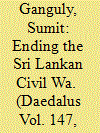

|
|
|
|
|
| Summary/Abstract |
The Sri Lankan Civil War erupted in 1983 and dragged on until 2009. The origins of the conflict can be traced to Sri Lanka's colonial era and subsequent postcolonial policies that had significantly constrained the social and economic rights of the minority Tamil population. Convinced that political avenues for redressing extant grievances were unlikely to yield any meaningful results, a segment of the Tamil community turned to violence precipitating the civil war. A number of domestic, regional, and international efforts to bring about a peaceful solution to the conflict all proved to be futile. A military strategy, which involved extraordinary brutality on the part of the Sri Lankan armed forces, brought it to a close. However, few policy initiatives have been undertaken in its wake to address the underlying grievances of the Tamil citizenry that had contributed to the outbreak of the civil war in the first place.
|
|
|
|
|
|
|
|
|
|
|
|
|
|
|
|
| 4 |
ID:
158459


|
|
|
|
|
| Summary/Abstract |
Fragility creates the conditions for violent intrastate conflict. Its consequences contribute to global disorder and mounting threats to U.S. national security. Significant impediments to effective action in fragile states persist today, even with many years of policy attention and an emerging consensus about its centrality in causing armed conflict. Policy-makers across the U.S. interagency have yet to arrive at a shared consciousness about the challenge of fragility, a shared understanding of the nature of the problem, and the types of capacities that can be comprehensively deployed to address it effectively. This essay describes recent advances in the development sector with regard to fragile states that suggest a way forward for stronger results. The steep challenges of tackling the complex causes of fragility tell us to be measured in our actions, but the experiences of recent progress and the urgency to alleviate human suffering tell us the time is right for greater ambition.
|
|
|
|
|
|
|
|
|
|
|
|
|
|
|
|
| 5 |
ID:
158460
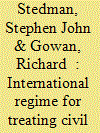

|
|
|
|
|
| Summary/Abstract |
The post–Cold War international order has promoted a “standard treatment” for civil wars involving the use of mediation to end conflicts and the deployment of peacekeeping forces to implement the resulting settlements. The United Nations has played a leading role in applying this standard treatment, which enjoys broad international support. By contrast, Western efforts to promote more robust humanitarian intervention as a standard response to civil wars remains controversial. While effective in relatively permissive postconflict environments, international mediation and peacekeeping efforts have proved insufficient to resolve harder cases of civil war, such as those in South Sudan and Syria. The UN has struggled to make the standard treatment work where governments refuse to cooperate or low-level violence is endemic. Growing major-power tensions could now undermine the post–Cold War regime for the treatment of civil wars, which, for all its faults, has made a significant contribution to international order.
|
|
|
|
|
|
|
|
|
|
|
|
|
|
|
|
| 6 |
ID:
158452


|
|
|
|
|
| Summary/Abstract |
Is prevention the answer to escalating violent conflict? Conflict prevention uses carrots and sticks to deter future violence. Its power thus rests on the credibility of policy-makers' commitment to supply the carrot or stick in a timely manner. Unfortunately, there are several political and bureaucratic barriers that make this unlikely. First, it is difficult for policy-makers to sell preventive actions to their constituencies. In contrast with core security interests (like nuclear warfare), an uptick in violence in a faraway, nonstrategic country provides a less convincing call for action. Second, preventive decisions are difficult to make. Decision-makers are predisposed to avoid making difficult decisions until a crisis breaks out and they are forced to act. Third, preventive actions are political, not technical, requiring the use of precious political capital for uncertain outcomes whose success may be invisible (manifest in the absence of violence). Perhaps, if decision-makers are able to overcome these obstacles and make more credible commitments to conflict prevention, then conflict prevention will become a more credible solution to violent conflict.
|
|
|
|
|
|
|
|
|
|
|
|
|
|
|
|
| 7 |
ID:
158450


|
|
|
|
|
| Summary/Abstract |
In this essay, I decouple violent jihadism from both religion and terrorism and propose an alternative, nonexclusive understanding of jihadi groups as rebel groups engaged in civil wars. Arguing that jihadi groups can be profitably approached as the current species of revolutionary insurgents, I offer a comparison with an older species, the Marxist rebels of the Cold War. I point to a few significant similarities and differences between these two types of revolutionary rebels and draw some key implications, stressing the great challenges facing jihadi rebels in civil wars.
|
|
|
|
|
|
|
|
|
|
|
|
|
|
|
|
| 8 |
ID:
158448
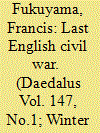

|
|
|
|
|
| Summary/Abstract |
This essay examines why England experienced a civil war every fifty years from the Norman Conquest up until the Glorious Revolution of 1688–1689, and was completely stable after that point. The reasons had to do with, first, the slow accumulation of law and respect for the law that had occurred by the seventeenth century, and second, with the emergence of a strong English state and sense of national identity by the end of the Tudor period. This suggests that normative factors are very important in creating stable settlements. Rational choice explanations for such outcomes assert that stalemated conflicts will lead parties to accept second- or third-best outcomes, but English history, as well as more recent experiences, suggests that stability requires normative change as well.
|
|
|
|
|
|
|
|
|
|
|
|
|
|
|
|
| 9 |
ID:
158455


|
|
|
|
|
| Summary/Abstract |
Limited statehood is frequently depicted as a major cause for civil war and violent conflict. Consequently, state-building efforts are often considered to be an effective tool for the prevention of civil war and violent conflict. This essay argues, however, that this assumption is misguided in several respects. First, at present and historically, areas of limited statehood are the global default rather than the exception. Thus, efforts to eliminate limited statehood would likely be unsuccessful. Second, limited statehood does not equal civil war and violence. In fact, only a small fraction of areas of limited statehood are affected by civil war. Third, a too-narrow focus on state-building may be counterproductive, as it may foster ineffective or even predatory state institutions. Such a focus also ignores the plurality of governance actors beyond the state that are relevant for effective governance–such as service provision and rule-making–in areas of limited statehood. Therefore, external actors like international organizations and foreign powers should contribute to governance-building rather than state-building, with a focus on service provision and rule-making institutions with a broader scope than the state.
|
|
|
|
|
|
|
|
|
|
|
|
|
|
|
|
| 10 |
ID:
158457


|
|
|
|
|
| Summary/Abstract |
State security and survival are critical issues in the rough regional environment of the Horn of Africa. Ensuring security for a state and its population is a priority and a raison d'ětre for any government. The buffer zone has emerged as a key strategy for nations in the Horn of Africa to manage successfully the security challenges of the several failed states in their neighborhood. Buffer zones are established adjacent to the borders of stronger states that oversee the buffer zones' affairs directly or through proxies. This essay explores the practical aspects of power asymmetries between successful and failed states from the perspectives of two officials in successful states who deal directly with this security challenge within the constraints of current norms and practices of sovereignty. The situation in the Horn of Africa provides insights into the effects of failed states on the security of their neighbors and the challenges that failed states present to the wider international community.
|
|
|
|
|
|
|
|
|
|
|
|
|
|
|
|
| 11 |
ID:
158449
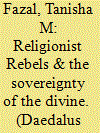

|
|
|
|
|
| Summary/Abstract |
Existing categorizations of rebel groups have difficulty classifying some of today's most vexing rebels–those, such as the Islamic State, that reject the Westphalian state system and depend on an almost entirely religious justification for their cause. Such rebel groups often have unlimited war aims and are unwilling to negotiate with the states whose sovereignty they challenge. In this essay, I present the new category of “religionist rebels.” I show that religionist rebels have been present throughout the history of the state system, and explore the particular challenges they pose in the civil war context. Religionist rebels are often brutal in their methods and prosecute wars that are especially difficult to end. But the nature of religionist rebellion also suggests natural limits. Thus, religionist rebels do not, ultimately, present a long-term threat to the state system.
|
|
|
|
|
|
|
|
|
|
|
|
|
|
|
|
| 12 |
ID:
158454


|
|
|
|
|
| Summary/Abstract |
This essay contrasts the two extremes used to address civil wars and weak states: costly and ill-designed interventions (Approach A) or minimalist approaches in which international actors either stay away or engage only to broker a deal or depose a dictator, but fail to build institutions and consolidate peace afterward (Approach C). This essay posits an alternative, a sovereignty strategy (Approach B), which would see core functions established in a sequence carefully tailored to context and delivered through partnerships between state, market, and civic actors over a period of decades. It analyzes whether a sovereignty strategy could be both feasible and affordable as an alternative to Approach A or C, whose costs are also very real, taking into account the costs and benefits of each option.
|
|
|
|
|
|
|
|
|
|
|
|
|
|
|
|
| 13 |
ID:
158458


|
|
|
|
|
| Summary/Abstract |
Syria's devastating war unfolds during unprecedented flows of imagery on social media, testing in new ways the media's influence on decision-makers. Three decades ago, the concept of a “CNN Effect” was coined to explain what was seen as the power of real-time television reporting to drive responses to humanitarian crises. This essay explores the role traditional and new media played in U.S. policy-making during Syria's crisis, including two major poison gas attacks. President Obama stepped back from the targeted air strikes later launched by President Trump after grisly images emerged on social media. But Trump's limited action did not shift policy. Interviews with Obama's senior advisors underline that the media do not drive strategy, but they play a significant role. During the Syrian crisis, the media formed part of what officials describe as constant pressure from many actors to respond, which they say led to policy failures. Syria's conflict is a cautionary tale.
|
|
|
|
|
|
|
|
|
|
|
|
|
|
|
|
| 14 |
ID:
158461


|
|
|
|
|
| Summary/Abstract |
The UN engagement in civil wars was almost nonexistent until the end of the Cold War, but recent experience brings some important lessons: the traditional principles of peacekeeping are ill-suited for civil war, as demands on peacekeepers, in particular the protection of civilians, are expanding. But military force is there to support a political strategy. The UN must focus on politics, using its comparative advantage–its independence–to win the confidence of the parties, while preserving its access to big powers to put pressure on them. However, it is challenged by the growing divisions in the Security Council, the changing nature of conflict, and a crisis of states that reflects long-term trends. This is not a reason for the UN to abandon its role in ending civil wars, but it needs to recalibrate its ambitions and adapt its approach: be less state-centric and more inclusive; more robust militarily; and more disciplined in its priorities.
|
|
|
|
|
|
|
|
|
|
|
|
|
|
|
|
|
|
|
|
|